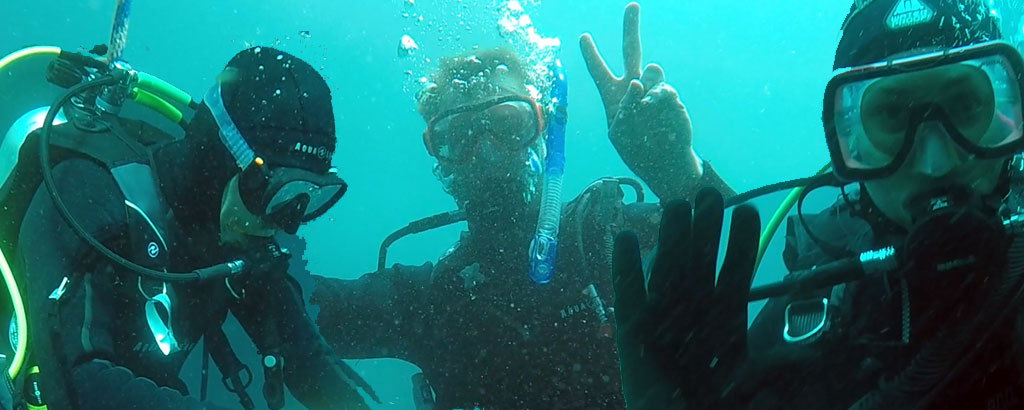Whether you are a new diver or seasoned diver, here are a few things that the may not have told you in your Open Water course:
- It’s OK To Tap Out
You can call any dive, for any reason. It’s OK to not go diving if you’re not up to it. Whether you’re tired, cold, nervous, uncomfortable, have equipment issues or just don’t feel like it – whatever the reason, if you’re not OK to go diving, don’t go. - Diving is Still a Buddy Sport
The better diver we become, the more comfortable we get with distance between our buddy and ourselves. But the fact of the matter is, your buddy is your back up life support. Have an equipment problem? Low on air? Computer battery died on a dive? Where’s your buddy? They should be close – within arm’s reach of you. Keep track of your buddy at all times. - Stop Kicking
We learn proper methods of fins kicks in our open water course. But in reality, kicking is something better divers try NOT to do. Learn to use the tides, currents and buoyancy to control your movement, and use as little movement in your legs as possible. Remember, your quadriceps, buttocks and hamstrings are large muscle groups. To use large muscles, you need more oxygen, and thus more air. Cut your air usage and stop kicking up silt and sand while relaxing and using smaller muscle groups like your ankles and feet. Introduce yourself to the frog kick like tech and wreck divers do. ~90 degree knee angle will help keep your fins off the silt. - Scuba is Like Yoga
Use as little motion as possible. The arms should not be involved. We put fins on for a reason – to make us more adaptable to our aquatic environment. Stop using your hands and use your fins. You’ll burn less air and maintain better buoyancy. - You Probably Do Have Enough Weight
“I don’t have enough weight, I can’t get down”. We’ve all been there, but you deflate your BC entirely and can exhale fully in a relaxed manner and descend, you have enough weight. When you’re nervous or holding air in your lungs, you may have enough weight to get down, but still can’t get down. Try calming yourself, exhaling fully and be patient. 3-5% of your body weight is proper weighting in fresh water (add a little weight for sea water or exposure suit). - Buoyancy Isn’t For Sissies
Whether you are a casual reef diver, a recreational diver, a tech diver, a wreck diver, or a diver with a task, buoyancy is imperative. And we’re not just talking about proper weighting – it’s proper breath control and relaxation. Get your buoyancy down and remember to write down the weight and equipment you use in your log book so you can refer to it next time you dive a similar situation. - Don’t Go For a Run after Diving
Feeling great after diving? Great enough to run or get in a quick workout? Remember that your body is full of nitrogen after diving – running and increasing your heart rate is like shaking a bottle of soda pop. While it’s important to stay fit to dive, exercising after diving increases your chance of getting bent and causing irreversible damage. Try taking a nap instead and workout after your 24 hour off-gassing period has ended. - You Burn Calories Diving
Believe it or not, you’ll burn calories simply by maintaining body heat. Whether you feel warm or shiver during your dive, your body is processing energy and using it up to keep maintain core temperature. You can burn up to 100-200 calories per dive, even in tropical locations. - Don’t Touch
Leave the underwater environment alone. That means critters, plants and corals alike. Freshwater, sea water, it doesn’t matter, these areas are marine habitat for plants and animals. Your disruption of the environment can introduce harmful bacteria, behavioral pattern changes and the removing of protective “slime” on some animals that can be fatal to them. Basic rule: it’s not your home, leave it alone. - Don’t Chase
Underwater animals are more likely to run away from you when you chase them down to snap a photo or get a better view. Instead, relax and calm your breathing and let the animal come closer to you. Any successful underwater photographer or videographer will tell you that relaxed divers will get closer to their subjects than those pursuing their subject in a frantic manner.
Now get out there and dive!

